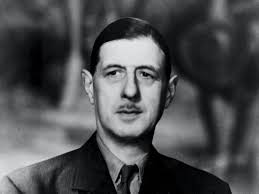De Gaulle tackled France’s loss of self-confidence by speaking for “la France profonde” and insisting that “France cannot be France without grandeur”. France could easily have wallowed in despair after the war or—what amounted to the same thing—listened more enthusiastically to Marxist intellectuals such as Jean-Paul Sartre. De Gaulle regarded national pride as the only cure for national suicide. Johnson has the same life-preserving instincts. He likes to think that he speaks for Middle England. He identifies Britain with “greatness” as naturally as the general identified France with “grandeur”. He is repulsed by the left’s characterisation of Britain’s past as nothing but a story of oppression and exploitation. It is not only factually wrong, in his view: it is also damaging to teach children to be ashamed of their country’s past.
戴高乐通过演讲“恒久法兰西”,并坚持“没有了伟大,就没有了法国”,来应对法国的自信心丧失。在战后,法国本可能很容易陷入绝境,或者说,法国本可能更加热情地听从让-保罗·萨特等马克思主义知识分子。戴高乐认为民族自豪感是国家自杀的唯一疗法。约翰逊也有着同样的保全国家生命的本能。他喜欢认为在自己是英格兰中产阶级的代表。他认为英国是“伟大的”,这就像戴高乐将军认为法国是“伟大的”一样顺理成章。左翼人士将英国的过去描绘为一个压迫和剥削的故事,约翰逊对此感到厌恶。在他看来,这不仅是事实上的错误,而且教育孩子们为自己国家的过去感到羞愧也是有害的。

The general looked forward as well as back: he knew that the best way to restore France’s grandeur was not just to talk about it but to revitalise the country.He ushered in the Fifth Republic, turning the state into an instrument of modernisation, creating a new technocratic elite, rationalising government and investing in infrastructure. France enjoyed “les trente glorieuses”, from 1945 to 1975, when GDP grew at an average of 6% a year.
戴高乐将军既展望未来,也会回顾历史:他知道恢复法国辉煌的最好办法,不能仅凭说说,而是要靠振兴法国。他建立了法兰西第五共和国,推进国家走向现代化,创建了新的技术官僚集团,使政府合理化,并投资基础设施。从1945年到1975年,是法国的“光辉三十年”,期间法国的国内生产总值平均每年增长6%。
Mr Johnson shares some of these instincts. He senses that the old political order is crumbling—hence his bold raid on northern voters. He senses that the Tories need to give a more active role to the state—hence his enthusiasm for big infrastructure projects such as HS2, a new railway, and even HS3 (a high-speed link between Leeds, Manchester and Liverpool). His description of himself as a “Brexity Hezza”—referring to Michael Heseltine, a leading Tory critic of Thatcherism, who believed that the state should take the lead in regenerating poor areas—is almost a way of saying “a Gaullist”. His two closest allies, Michael Gove, the cabinet-office minister, and Dominic Cummings, his chief adviser, want to put reforming the state at the heart of politics.
约翰逊也有同样的天份。他感觉到旧的政治秩序正在瓦解,因此他大胆争取北方选民。他感觉到保守党需要对国家发挥更积极的作用,因此他对大型基础设施项目充满热情,比如HS2工程(一条新铁路),以及HS3工程(连接利兹、曼彻斯特和利物浦的高速铁路)。约翰逊将自己描述为“脱欧的赫扎派”——指的是保守党的一位对撒切尔主义的主要批评者迈克尔·赫赛尔廷,他认为国家应该带头复兴贫困地区——这几乎是一种“戴高乐主义者”的说法。约翰逊的两个最亲密的盟友,内阁府部长迈克尔·戈夫和首席顾问多米尼克·卡明斯希望把改革国家置于政治的核心。
译文由可可原创,仅供学习交流使用,未经许可请勿转载。













